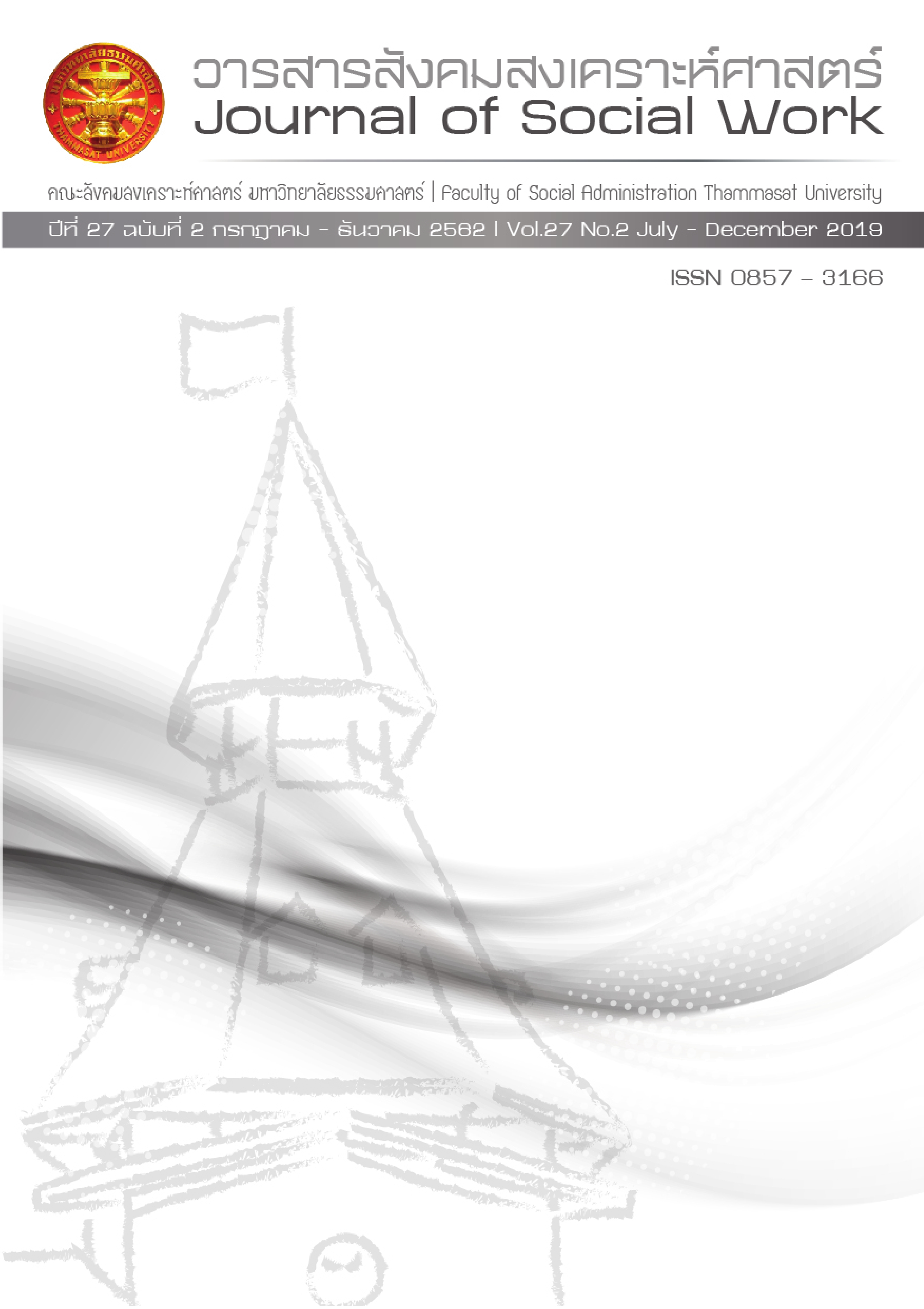Automation Unitization and Required Skills for Thai Suppliers in the Automobile Industry
Keywords:
Automation, Skill, Thai SuppliersAbstract
This article is based on the qualitative research “Skill Requirements of Thai 1st and 2nd tier Suppliers for Automation in the Automobile Industry” which aims to study automation utilized in Thai suppliers as well as to seek for required skills. It gathers data through in-depth interview with 16 representatives from 10 Thai Suppliers in the Automobile Industry. With Thematic Analysis System, this research reveals 3 key themes. First is production characters that are suitable for automation utilization are repetition work, critical and hard working. Labour shortage is the main reason for applying automation. Second is some conditions such as the old mindset of the owner, the adaptability of workers, and the ability to do the integration system are core obstacles to automation utilization. Last but not least is required skills for production workers which include fundamental knowledge for technician, precision, English fluency (reading ability), multiple skilling, the ability to follow work instruction, reporting skill, and quality concern. Meanwhile, workers who are directly responsible for the automation utility are required to have multidisciplinary abilities on mechanical electronic, electronic, and mechatronics as well as problem solving skill, system thinking, creativity, and learning ability. Both groups also required to have “soft skills” such as responsibility, endurance, self-disciplined, and passion to work. Recommendations for skill formulation include more emphasis on apprenticeship, on the job training, and the dual system.
References
กิริยา กุลกลการ. (2561). การบริหารทุนมนุษย์ไทยในเศรษฐกิจยุค 4.0. สำนักงานที่ปรึกษาเพื่อพัฒนาแรงงานแห่งชาติ. กรุงเทพฯ: กระทรวงแรงงาน.
ธัญญลักษณ์ วีระสมบัติ. (2560). ปัญหาด้านการบริหารแรงงานของซัพพลายเออร์ไทยในอุตสาหกรรมยานยนต์. โครงการ ASEAN watch สำนักงานกองทุนสนับสนุนการวิจัย (สกว). กรุงเทพฯ.
นฤดม เจริญพาณิช. (2556). การศึกษาแนวโน้มการเลือกใช้เครื่องจักรอัตโนมัติ กรณีศึกษา บริษัท โตโยต้า มอเตอร์ ประเทศไทย จำกัด. กรุงเทพฯ: คณะเศรษฐศาสตร์ มหาวิทยาลัยธรรมศาสตร์.
พีระ เจริญพร. (มีนาคม 2553). การแสวงหาผลประโยชน์จากการเป็นซัพพลายเออร์ของบริษัทข้ามชาติ: กรณีศึกษาอุตสาหกรรมชิ้นส่วนยานยนต์ไทย. วารสารเศรษฐศาสตร์ธรรมศาสตร์. 28(1): 35-83.
ศูนย์วิจัยกรุงศรี. (2561). อุตสาหกรรมยานยนต์แห่งอนาคต. สืบค้นจาก https:// www.krungsri.com/bank/getmedia/ea01c4db-2f94-4299-83ec-89bb74 161eab/RI_Automobile_180926_TH.aspx
ศูนย์วิจัยกสิกรไทย. (2560). SMEs ไทยก้าวทันกระแสยานยนต์ยุค 4.0 แล้วหรือยัง. สืบค้นจาก https://www.kasikornbank.com/th/business/sme/KSMEKnowledge/article/KSMEAnalysis/Documents/ThaiAutomotive4.pdf
สภาอุตสาหกรรม. (2561). สถิติการผลิตรถยนต์. สืบค้นจาก https://www.fti.or.th/ 2016/thai/ftitechnicalsubdetail.aspx?id=1280
สมชาย หาญหิรัญ. (2557). แนวโน้มอุตสาหกรรมยานยนต์และชิ้นส่วนยานยนต์ในปี 2557-2560. เอกสารการประชุมสำนักงานเศรษฐกิจอุตสาหกรรม กระทรวงอุตสาหกรรม. กรุงเทพฯ: กระทรวงอุตสาหกรรม.
อาชนัน เกาะไพบูลย์. (2552). Global Integration of Thai Automotive Industry. กรุงเทพฯ: ศูนย์บริการวิชาการเศรษฐศาสตร์ (ERTC)
Modern Manufacturing. (2561). ถึงเวลาใช้ระบบอัตโนมัติกับอุตสาหกรรมชิ้นส่วนยานยนต์ไทยในตลาดชิ้นส่วนทดแทน. สืบค้นจาก https://www.mmthailand.com/%E0%B8%96%E0%B8%B6%E0%B8%87%E0%B9%80%E0%B8%A7%E0%B8%A5%E0%B8%B2%E0%B9%83%E0%B8%8A%E0%B9%89%E0%B8%A3%E0%B8%B0%E0%B8%9A%E0%B8%9A%E0%B8%AD%E0%B8%B1%E0%B8%95%E0%B9%82%E0%B8%99%E0%B8%A1%E0%B8%B1%E0%B8%95/
Modern Manufacturing. (2561). Automation กระดูกสันหลังอุตสาหกรรมยานยนต์. สืบค้นจาก https://www.mmthailand.com/automation%E0%B8%A2%E0%B8%B2%E0%B8%99%E0%B8%A2%E0%B8%99%E0%B8%95%E0%B9%8C/
Published
How to Cite
Issue
Section
License
The manuscripts published in the Social Work Journal is the copyright of the Social Work Journal, Thammasat University
Any article or opinion appeared in the Social Work Journal will solely be under the responsibility of the author The Faculty of Social Administration, Thammasat University and the editors do not need to reach in agreement or hold any responsibility.



